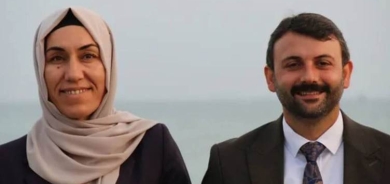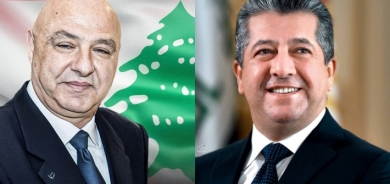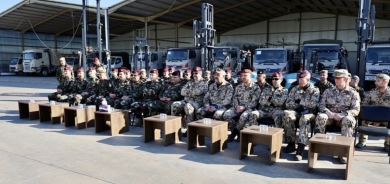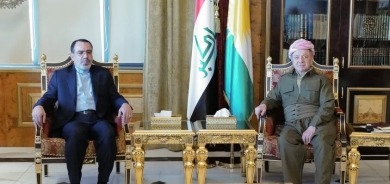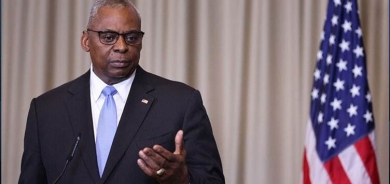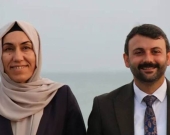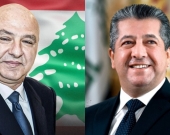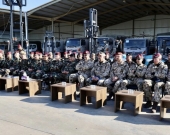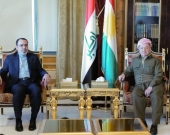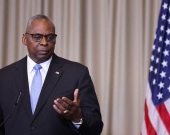Kurdish and Iraqi widows find common ground at “Encounters of Compassion”

But the International Commission on Missing Persons (ICMP), the Martyrs Foundation in Baghdad and the Kurdistan Region’s Ministry of Martyrs and Anfal Affairs pulled together and enabled two groups of women, who would have never met otherwise, to share their suffering and sow the seeds of what is hoped to be lifelong friendships.
After five weeks of planning, the 29 women were brought together at the Rotterdam City Hotel in Erbil on Sunday for the Encounters of Compassion conference.
Mixed into groups with equal numbers of Iraqis and Kurds, little difference could be found between the women. Almost all were clad in black, long-flowing chadors and hijabs, with only a few Kurdish women in colorful clothes and makeup.
With an opportunity for the women to talk with each other, it soon became clear that the similarities went far deeper.
The stories included one from an Iraqi woman who, over a period of just four years, lost four brothers, one after the other, and watched helplessly as two more were arrested and detained. Others spoke of babies being poisoned and witnessing the rape of young girls by officers in detention centers.
“We have the same suffering, we have the same feelings,”
"We have the same suffering, we have the same feelings," said Naziha Om Houssam, 47, whose father, uncle and brother-in-law were executed by Saddam's regime. Om Houssam is the head of the women's section of the Political Prisoners Foundation in Iraq.
"I know exactly how they feel because we went through the same experience. We all lost our husbands, sons and fathers, and it was the same criminal who was responsible," she added.
One of the translators at the event, Sabriya Nadir Ali, saw the women's perspective change during the two-hour discussion.
"In the end, they saw how they have one problem -- they all lost their family, their honor, their money, everything they had, to Saddam Hussein," she said.
A few women present were able to share some extraordinary experiences, such as Sabiha Qasim Hassan, 66, whose sister Leila was the first woman in Iraq to be executed by the Baath regime for political reasons. Her trial was broadcast across the nation.
"I am proud of my sister. She refused to deny her Kurdish ethnicity and was killed because of it," Hassan said. "She is a symbol for all Iraqis."
Also present was widow Shazada Hussein Mohamed, 59, from the Garmiyan village of Serha. Mohamed was the lead actress in a critically acclaimed film, “Son of Babylon,” about a grandmother and grandson journeying through Iraq in search of her missing son.
She spoke about her experiences on set, promoting the film and participating in workshops around the world.
Razaw Baba Yaba, also from Serha, described with pride how she gave testimony at Saddam Hussein's trial. Yaba lost three of her sons as well as her husband.
Taking the opportunity to learn and share information about their lives, groups laughed over differences in culture and bonded over the hardships faced by many martyr families.
Loneliness was a common problem, particularly for widows who rarely remarry and face stigmas from society. Even the children of martyrs, seen as having no “name” or proper family background, struggle to marry.
While widows of the Iran-Iraq war were given generous benefits, as were those widowed in the aftermath of the 2003 invasion, widows whose families were targeted by Saddam Hussein were largely left to fend for themselves.
Reliving the pain
On the second day of the conference, the women travelled to Slemani to visit Amna Suraka (the Red Prison), a former detention center that has since been turned into a historical museum site.
After entering the prison, many women broke down crying while viewing exhibits, while a few became overwhelmed with grief and sought refuge in the museum's cafe. Some said they saw "death bodies” – the ghosts of their beloved.
Om Houssam was one of those who became too emotional to continue on with the tour. She was sent to the notorious Nugra Salman prison in southern Iraq as a scared and pregnant 16-year-old. Om Houssam endured seven months of constant psychological and physical torture.
She says the prison in Slemani looks identical to the one in Basra, which was torn down years ago, and the methods of torture used were also the same.
She mimics the statue of a man handcuffed to a stairway, and describes her own treatment at the hands of officers: "Before questioning, they would scare prisoners by tying their hands to the stairs and blindfolding them. Sometimes they would kick or hit us. We didn't know what was going on, or why we were there."
She says she was also beaten and whipped, but not electrocuted. Om Houssam exited the prison with a severe headache, feeling dizzy. "I'm back there; I'm reliving those days," she said.
Langa Dizayee, an adviser from the Ministry of Martyrs and Anfal Affairs, found herself crying while comforting a woman from Basra and another from Barzan, both of whom had collapsed and were sobbing uncontrollably.
"I've been working with the ministry for seven years and I feel like a member of each family when I see them," she says.
Dizayee says the event is not just intended to foster solidarity between martyr families in the Kurdistan Region and other parts of Iraq, but to realize, document and archive their stories for future generations.
“I want our Iraqi nation to be united, because we suffered together under Saddam's regime.”
Nasir Sha'alan, from the Care Council of the Martyrs Foundation in Baghdad, agrees. "I want people, Iraqis and others outside Iraq, to know what exactly happened under Saddam Hussein’s regime in the north and the south. He killed them all."
Sha'alan also has another hope from the outcome of Encounters of Compassion: "I want our Iraqi nation to be united, because we suffered together under Saddam's regime.”
"Now we have our freedom and we don't want to lose this and grow apart. I hope we will be reunited by these women," he said.
At the end of the day, Sha'alan gathers the women for a final goodbye. He smiles as the women embrace and promise to phone each other as soon as they are home.
Sinje Caren Stoyke, the ICMP's Civil Society Initiatives Program coordinator, is responsible for empowering the public and civil society groups in issues related to mass grave victims, including reconciliation.
After spending weeks preparing for the conference, she is looking forward to the next Encounters of Compassion, which will likely send Kurdish women to Iraq.
"It was the first time we did this and we had no idea whether these women would get along or even relate to each other," Stoyke says. "This has exceeded my expectations and whatever hopes I had."
Mohamed has taken the phone numbers of every woman in her group as well as those she befriended outside the discussions. She feels that while this trip has reopened old wounds, it has also healed them.
"I've realized I have friends in the south and this experience has helped me to forget the past and concentrate on the future," says the 59-year-old.
"I feel younger because of these two days."
Source: Rudaw


